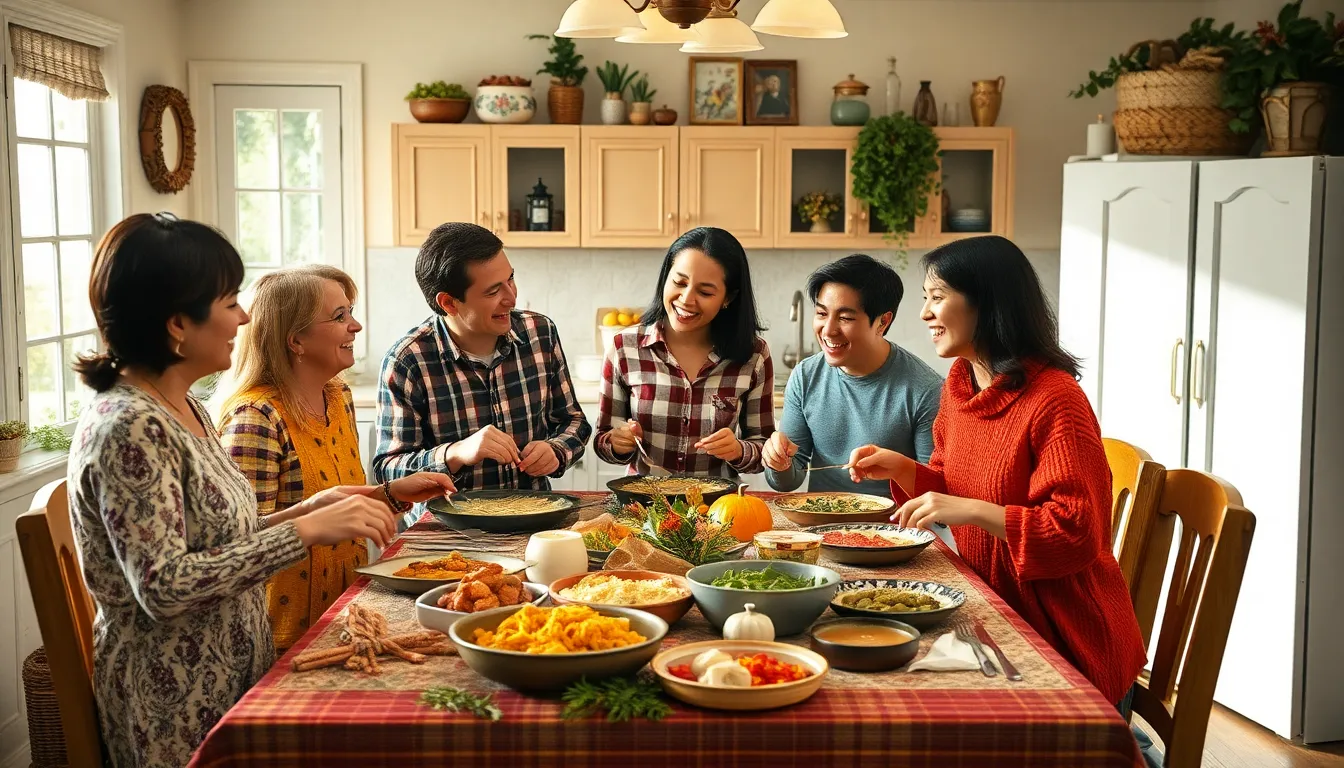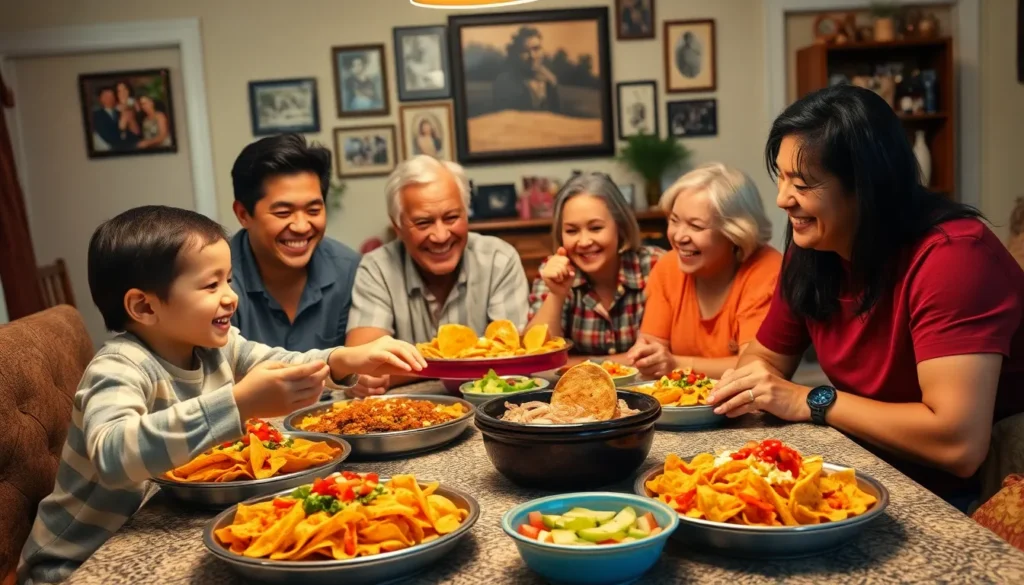Family traditions are like the secret sauce that makes every gathering a little more flavorful. They’re those quirky rituals and beloved customs that turn ordinary moments into cherished memories. Whether it’s a weekly taco night where everyone fights over the last chip or an annual holiday scavenger hunt that ends in laughter (and maybe a few tears), these traditions connect families in ways that nothing else can.
In a world that often feels chaotic, these time-honored practices offer a comforting sense of stability. They remind us of where we came from and who we are. Plus, they provide endless opportunities for inside jokes and playful banter. So, let’s dive into the delightful world of family traditions and discover how they can transform the everyday into something truly special. After all, who wouldn’t want to be part of a family that embraces the weird, the wonderful, and the downright hilarious?
Table of Contents
ToggleUnderstanding Family Traditions
Family traditions encompass unique rituals and customs that families establish over time. These practices enrich gatherings and promote memories that last a lifetime.
Definition of Family Traditions
Family traditions include cherished activities, rituals, or customs families maintain together. Weekly game nights or holiday meals represent common examples. Each tradition carries significance, serving as a bond that connects family members across generations. Shared experiences, such as annual camping trips or service projects, foster unity and a sense of belonging. These traditions often evolve, reflecting the family’s values and history while adapting to changing circumstances.
Importance of Family Traditions
Family traditions play a vital role in establishing a sense of identity and belonging within families. They provide comfort and stability amid life’s challenges. Regular interactions during these traditions create strong emotional ties among members. Families develop shared memories during special events, enhancing relationships and encouraging communication. These rituals promote values, teaching important lessons about love, hard work, and gratitude. By embracing traditions, families cultivate a legacy that preserves their unique history and connection for future generations.
Types of Family Traditions

Family traditions encompass various categories that strengthen bonds and enrich experiences. Exploring these types reveals how diverse and meaningful family customs can be.
Cultural Traditions
Cultural traditions involve practices specific to a family’s heritage. Celebrating cultural holidays brings families together to honor their roots. Families may participate in religious ceremonies that reflect their beliefs. Sharing traditional foods during family gatherings can spark conversations about history. Storytelling often plays a crucial role, passing down legends and values across generations. These customs reinforce identity and create memorable experiences tied to a shared cultural background.
Seasonal Traditions
Seasonal traditions occur at specific times throughout the year and often celebrate changes in nature. Families might engage in activities such as decorating for holidays, which can foster excitement and anticipation. Springtime egg hunts and summer barbecues are common ways to enjoy the outdoors together. Gathering for autumn festivities like pumpkin carving and winter celebrations with gift exchanges strengthen family ties. Seasonal traditions provide an opportunity for families to create joyful memories and celebrate their togetherness during distinct times of the year.
How Family Traditions Strengthen Bonds
Family traditions play a crucial role in strengthening family bonds. These unique rituals enhance connections and create lasting memories that families cherish together.
Creating Shared Memories
Creating shared memories stems from fun family activities, such as game nights or holiday celebrations. These events allow family members to engage with one another and contribute to a collective memory bank. The act of celebrating milestones, like birthdays or anniversaries, reinforces relationships. Traditional meals or special recipes often evoke nostalgia, linking past experiences to present gatherings. Each occurrence becomes a reminder of love and togetherness, ensuring that families remain united through these shared experiences.
Encouraging Communication
Encouraging communication is vital in building strong family relationships. Scheduled traditions provide opportunities for family discussions and interactions. Activities such as storytelling during holiday dinners foster an environment of openness. Sharing their experiences, family members strengthen their emotional bond and build trust. Daily or weekly rituals, like shared meals, allow members to discuss their lives, creating deeper connections. Regular communication helps family members understand each other better, ultimately reinforcing the family’s unity.
Tips for Building New Family Traditions
Creating new family traditions enhances unity. Engaging each family member ensures traditions are meaningful and personal.
Involving Everyone
Involvement encourages participation and investment in family traditions. Gathering input from different family members can lead to fresh ideas. For example, children might suggest fun activities like movie nights or themed dinners. Adults can share their favorite experiences and favorite holiday customs. Each suggestion fosters deeper connections and inclusivity. By rotating who leads each tradition, everyone takes ownership of the family activities. Allowing flexibility creates a balance between excitement and family values. Prioritizing everyone’s input ensures traditions resonate across age groups.
Making Traditions Adaptable
Adaptability keeps traditions relevant over time. Life changes, so traditions should evolve with the family. Consider seasonal variations that reflect age milestones or changing interests. For instance, a once-favored game night can transform into a trivia challenge or a new board game. Furthermore, including different themes or cuisines introduces variety. Observing children’s preferences during gatherings invites adjustments that keep everyone engaged. Traditions can also shift to accommodate new family members, such as partners or in-laws. Emphasizing flexibility allows traditions to grow with the family, maintaining their significance and relevance.
Family traditions play a vital role in nurturing connections and creating lasting memories. They offer a sense of identity and belonging while providing comfort during life’s ups and downs. By engaging in these cherished rituals families not only celebrate their unique histories but also foster deeper relationships through shared experiences.
As families explore new traditions and adapt existing ones they can ensure that these practices remain meaningful across generations. It’s not just about the activities themselves but the love and laughter that fill each moment. Embracing family traditions enriches lives and strengthens bonds making every gathering an opportunity for joy and connection.










